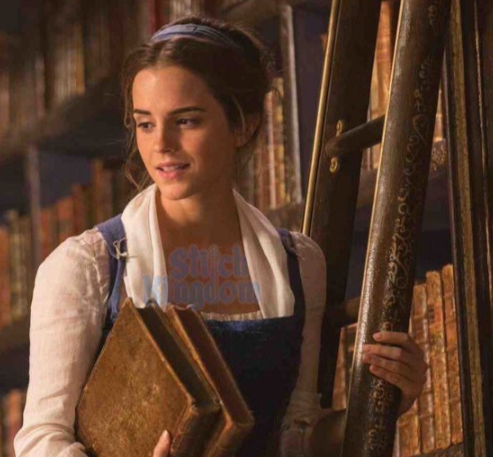The epic, sweeping romance that embodies the animated Disney version of Beauty and the Beast could not possibly be translated into live action form in 2017 without just the faintest bit of heightened feminism. But, of course, because it is Disney, such a statement can’t be too overt, lest the film risk being banned in another theater. Thus, the update is scrupulous in many ways and gives us an immediate snapshot of The Prince’s (Dan Stevens) La Dolce Vita lifestyle as he prepares for a ball by applying David Bowie-esque makeup and staring at himself in an ornate mirror (fourteenth century France really was where it was at for decadence–unless you were a peasant and/or suffering from the bubonic plague). Indeed, most of his nights–just like this one–are spent in hedonistic glory, with The Prince taking little, if any, time to consider others. When his fête is interrupted just as Madame de Garderobe (Audra McDonald) is in the midst of a bombastic opera solo to the tune of her husband Maestro Cadenza’s (Stanley Tucci) beat, it is by an old, unsightly woman seeking shelter from the storm.
The Prince laughs at her gall in presenting him with a rose as a form of repayment for what she mistakenly assumes will be his generosity. Upon briefly letting the humiliation he inflicts wash over her, the Enchantress (Hattie Morahan), a great beauty in her own right, morphs into her actual incarnation, providing the narration, “she had seen that there was no love in his heart, and as punishment, she transformed him into a hideous beast.” Making his inside match his outside, the Enchantress is a more prominent figure in this edition of the story, a sort of consequence enforcer for women everywhere subject to the fuckboy. And, speaking of, Gaston (Luke Evans), is especially DuChez in the latest version, with his sidekick, LeFou (Josh Gad), getting his own touch of modernity by being played as gay (though some might be offended that “over the top” automatically means homo). Serving as a sort of personality doppelgänger for The Beast in his previous life, Gaston gives Belle ample reason to despise the type of people that make her want to scream, “There must be more than this provincial life.” His motives for wanting to marry her seem particularly grotesque in a live action format, trying to persuade her by looking over at one of the local spinsters, Agathe a.k.a. the Enchantress, and cautioning, “You know what happens to spinsters in this town?”
Belle, however, does not possess any tolerance for fuckboys–which is precisely what lies beneath her predilection for bestiality. That, or maybe her and The Beast simply realize that they’re the only two literate people in the radius of Villeneuve, and all that business about being her belligerent captor slowly melts away from both of their minds–being the only intelligent person among a crowd of dafties can be lonely enough to make you love anyone with a brain.
Regardless of the dubious reasons that conspire to make Belle and The Beast fall in love, director Bill Condon–no stranger to working with adaptations (and Ian McKellen) like Gods and Monsters, Dreamgirls and the final two installments of the Twilight series–renders the live action version with a largely faithful interpretation of the original script, reworked by screenwriters Stephen Chbosky and Evan Spiliotopoulos. But maybe the undercutting themes of railing against fuckboys and narrow-mindedness are more pronounced. There are subtle tweaks here and there, like making Belle the inventor instead of Maurice (Kevin Kline), now a music box maker. Because of all the time Belle saves by creating a horse-powered mechanism to do her laundry for her, she has ample opportunity to engage in her bibliophilia. Like Britney Spears, Belle is often irritated by how overprotected she is–using books like The Tragedy of Romeo and Juliet as a means of mental escape, since physical escape seems impossible (a sort of foreshadowing effect that gets literalized when The Beast takes her as his prisoner).
The addition of parental backstories to The Prince and Belle feel a bit contrived, as though the producers wanted to ensure that the audience would find empathy for two fucked up people by tossing in the line, “You can’t judge a person by who their father is” (oh yes you fucking can). And that musical solo The Beast gets to have next to his precious rose is a bit uncomfortable, but, other than that Beauty and the Beast is the sort of crowd-pleaser that can appeal to both village idiots and castle dwellers.




















